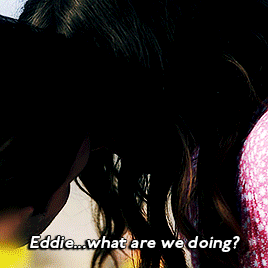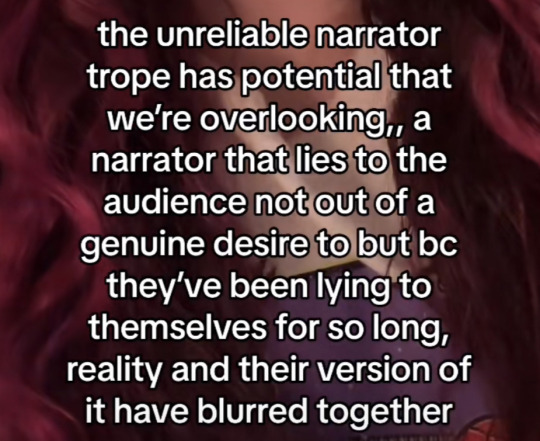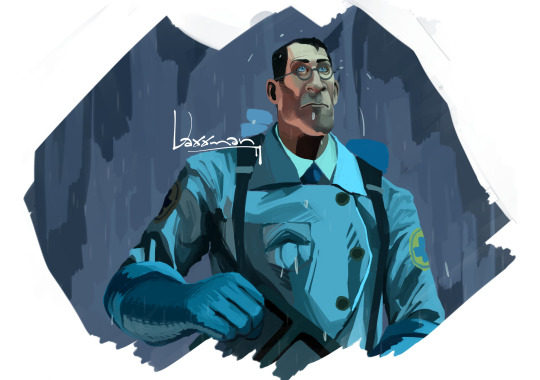#of unreliable narrator
Text
I can make all sorts of posts about how the dynasty isn't evil or whatever on here but the fact of the matter is who gives a shit. Leylas is hot and she can do whatever the fuck she wants. I support women's wrongs. The simple truth is that nobody in the crusty, dusty empire government is as hot as she is and that's a fact
#critical role#leylas kryn#the kryn dynasty#whenever i make a post about this anyway#people assume that i just#dont know the lore#which is always fun#essek i love you but your stans#need to print out the definition#of unreliable narrator#and put it under their pillow
50 notes
·
View notes
Text
I feel like many people have a fundamental misconception of what unreliable narrator means. It's simply a narrative vehicle not a character flaw or a sign that the character is a bad person. There are also many different types of unreliable narrators in fiction. Being an unreliable narrator doesn't necessarily mean that the character is 'wrong', it definitely doesn't mean that they're wrong about everything even if some aspects in their story are inaccurate, and only some unreliable narrators actively and consciously lie. Stories that have unreliable narrators also tend to deal with perception and memory and they often don't even have one objective truth, just different versions. It reflects real life where we know human memory is highly unreliable and vague and people can interpret same events very differently
#the way some people (usually lestat fans lol) talk about louis being an unreliable narrator has frustrated me#i still insist louis' unreliableness is mostly subtle (passing quickly over things he doesn't want to think about#presenting things that factually happened in a way he can build a story that makes sense to him#not knowing what lestat is thinking and feeling so interpreting him differently than lestat himself probably would)#rather than he's telling something that didn't really happen or is under armand's mind control or something#like for example i think it's been made very clear all the abuse really happened they're not gonna suddenly pull the rug from under it#if anything i feel lestat is going to turn out to be even worse than louis perceived him when we hear people who are not in love w him lol#keanu.txt
28K notes
·
View notes
Text










Eddie's selective memories vs the full picture
#i love my guy. he is the most unreliable narrator.#al gifs#eddie diaz#shannon diaz#911 abc#911 spoilers#bro. they were just kids. do you ever think about that. they were just kids.
2K notes
·
View notes
Text
I'm on a duet kick and I'm marvelling about what an amazing song Somebody That I Used to Know is from a narrative perspective. We're told this sad tale about love and we're all sympathizing with this poor man:

And then the girl shows up shouts, "UNRELIABLE NARRATOR!"

The guy tries to get us back, "No wait! This is my pity party! Hear my sad tale again." But he's lost us, we can't see him in the same way again. The spell is broken. And the spell remains broken, you cannot hear the first verse in the same way ever again.
The acting in the music video too, the way he silently accepts her words. The way he flinches as she talks. He was trying to write his own narrative but he can't stand hearing the truth. And he has no new rebuttal, he can't refute her.
2K notes
·
View notes
Text
the fact that tolkien started writing lord of the rings, realised that the entire concept of the one ring made various plot elements of the hobbit fall to pieces, and dealt with this by saying 'the reason this makes no sense is because the hobbit is from bilbo's perspective and he fudged the truth' is already extremely powerful. but then he actually went the extra mile and re-released the book as essentially the same book but with the plot holes fixed and said 'please enjoy this Objectively True version of this story, untainted by bilbo's mischievous lies' like what a flex. absolute madlad
#playing the 'unreliable narrator' card to hide the fact that your sequel created a retroactive continuity error in your first book?#bold move#rewriting your first book to fix the stuff that didn't make sense?#INCREDIBLY bold move.#be shh now#lotr#the hobbit#i think more authors should do this instead of frantically trying to justify mistakes in their work#that thing you noticed that didn't make sense? don't worry about it bro. didn't happen#containment breach
28K notes
·
View notes
Text

Kim dokja
2K notes
·
View notes
Text
comics are in and of itself, an unreliable narrator.
i say this because i started my comic journey with jason todd. i read all his robin appearances, pre and post crisis, then read hush and under the red hood, and all i could think about was what the fuck. what the fuck batman. how did you become this. what happened between 1988 and 2006. how did the the man who's life revolved around caring for this child, teaching this child, learning from this child, protecting this child, losing this child — become hurting him.
it was so baffling to me i found myself slipping into the batman shaped void that many never return from (lol). and so now, i have read over 1500 batman comics, over 300 different writers, spanning over 80 years of publication. i finally get to what happened between 1988 and 2006, and how batman as a character has become as unrecognisable as he has remained familiar. i see the events of alpod, knightfall, cataclysm, no man's land, the 200 individual batman issues and 200 individual detective comics issues alone that had passed, not taking into account the the other long runs, mini runs, short stories or collaborative comics that were released in those 18 years. the people he had met, lost, been betrayed by, abandoned in those stories.
it has only been about 5 years since jason todd died for bruce wayne. 5 years that have felt like two decades.
it has only been around 4 years for jason since he climbed his way out of his grave. 4 years that felt like less than three.
so when reading as jason, i felt betrayed. how could batman do this? how can't he see? he knows how i would have mourned him, he knows how fiercely i love him, how all i want is for him to prove he ever loved me the same way. how can he not change after all these years? how is he not aware that he is not the change gotham needs? (how does he not see that he is what i need — needed.) how will he save gotham? he can't. he can't save gotham. he can't save me. but i can. i can fix it.
then i read as bruce and i am betrayed. who is this? why does he doubt how much i loved him? what changed? why did he change? (am i the one who changed? no, surely not.) after everything, the people i have hurt, the people i have lost, the people i have sacrificed for gotham, how can he doubt? he would have never asked me to do this before, he understood, i'm sure he did, before. i won't choose. i can't choose. where is my son. where am i. i can't save gotham. i can't save you. but i can fix it. i can fix you.
they're both wrong.
#the next step after realising your fav character is an unreliable narrator#is admitting you are too#bruce wayne#jason todd#saki comic talks
1K notes
·
View notes
Text
subjective perspective =/= unreliable narration
like. i am holding you gently by the face. listen to me. all narration will reflect a subjective experience. this is not the same as an unreliable narrator. the unreliable narrator lacks credibility for a specific reason - they’re an exaggerator, they’re insane, they’re a joker, they’re an outright liar. a character whose view of things is merely coloured by their backstory and experiences is not inherently unreliable, simply subjective. an unreliable narrator is intentionally or significantly altering the truth, to position the audience deliberately. it’s a specific literary device, not a default in POV storytelling.
#books#saw someone call Damen an unreliable narrator again and hmmm#he just. isn’t.#as a narrator he isn’t positioned to actively hoodwink you (the reader)#he is the conduit through which you (the reader) also discover the details of the story#anyway. today on mini lit lessons with tumblr user b irregularcollapse#mini lit lessons
4K notes
·
View notes
Note
Could you maybe write some prompts for portraying an unreliable narrator?
How to Write an Unreliable Narrator
-> 8 Tips to Writing Unreliable Narrators - Writer's Digest
make them a liar. Have them commit their faults outright, contradict themselves in the narrative, prove them to be a liar by their actions, have them hint that they know more than they're telling, reveal the truth a little later than they should, or have gaps in their memory.
shift their motives. Give your character conflicting desires and changing drives. Keep your reader guessing about their true mindset. (Are they in love with Character B? Or are they obsessed with Character B? Do they want to help B, or do they want to harm B?)
make them more clever than they appear. Have your reader believe your character is innocent and incapable of cunning and calculating schemes. Maybe they appear innocent and naive to the reader, and only later it is revealed that their childish actions have purpose.
use your secondary characters. Have them catch your narrator in lie, reveal that they are a victim of your narrator's lie, reveal a truth that the narrator has yet to share with the reader. How they treat the narrator can also show their unreliability. Sharing personal histories with the narrator may expose a side to the narrator that the reader hasn't seen.
add an unpredictable act. When a calm, thoughtful, innocent character suddenly does something out of character and a little unhinged, they become unreliable. (ex: a grieving woman suddenly throws all of her husband's belongings in the lake.)
4 Types of Unreliable Narrators:
-> What Is an Unreliable Narrator? - MasterClass
Picaro. The picaro is a character who has a knack for exaggerating.
Madman. The madman is unreliable because they are mentally detached from reality.
Naif. The naif’s narrative abilities are impacted by inexperience or age.
Liar. The liar is the most deliberate of all the unreliable narrators. The character fabricates stories, often to paint a better picture of themselves or achieve a desired outcome.
If you like what I do and want to support me, please consider donating! I also offer editing services and other writing advice on my Ko-fi!
#creative writing#writeblr#ask box prompts#how to write#how to write an unreliable narrator#unreliable narrators#writing help#writing advice#writing tips#writing tools#writing characters#writing resources#writing prompts
1K notes
·
View notes
Text

#AAAAAAAAAAAAAHHHHHH#MY FATHER GUYS ITS MY FAYHER SHEN JIU#SHEN JIUUUUU WHERE IS HE#Guys I'm hysterical#shen jiu#svsss#scum villain#scumbag self saving system#scum villain self saving system#this danmei was my first danmei it has a special place in my heart#as much as I like sqq our resident unreliable narrator I want shen jiu still#I hope you're happy somewhere 😭#I get psychic and emotional damage every time I think of you
1K notes
·
View notes
Text
Cale: I want a slacker life.
Cale: But to have a peaceful life, my family needs to have a peaceful life as well, and we need to live in a peaceful world too to not be bothered by anyone.
Cale: So let’s achieve world peace.
Cale: Then let’s do multiverse world peace because other worlds could also bother us and for an unknown reason I HAVE to be the one who does it instead of sending my subordinates and lazing around.
Cale: And while striving for world peace, something that nobody has been able to achieve so far, I’ll complain that I don’t want to work and say I’m weak.
Cale: Ah, I’m weak. *killing the strongest villain who tried to become god*
Cale: I want a slacker life. *trying to achieve world peace and working more than anyone else*
Cale: Sigh…
Reader: Sigh…
#just Cale being the most unreliable narrator ever#tcf#lcf#trash of the count's family#cale henituse#facepalming#🤣🤣🤣#Eruhaben: You unlucky bastard…
1K notes
·
View notes
Text
Sherlock Holmes is not actually cold and emotionless he is relentlessly passionate and loves his work and his life so much and anyone who tells you otherwise is a filthy liar. yes including Watson who he also loves
690 notes
·
View notes
Text


M
#team fortress 2#tf2#tf2 medic#emesis blue#when I said “I will stick to black and white”? I lied screencap redraw be upon ye#Dr Ludwig is the unreliable narrator ever#I want to redraw so many scenes from this movie all the shots are beautiful#I normally dislike horror movies because I'm a wuss who can't watch scary things#10 seconds into the movie and I had to look away when the camera zoomed in onto the respawned soldier's face but#when doc beheaded that guy in the chapel? and the whole congregation was applauding????#insanely cool
910 notes
·
View notes
Text
UNRELIABLE NARRATORS; FINALS.


Eugenides Propaganda:
the entire plot hinges on a detail he lets the reader (and every other character) assume is true. I don't want to spoil it because it's a really fun reveal but he is lying from the first second he appears on the page and you can't trust him to tell the full truth about ANYTHING related to himself and his goals. he mostly does it to keep his advantage and not have other characters be suspicious of him but it's just so fun when you realise he's been lying the whole time
Lemony Snicket Propaganda:
(I would like to preface this by saying that Lemony Snicket is the author's pen name, not a real person, and he exists as a character in-universe as well as being the one in-universe who writes the books!) I'd say he's unreliable because he spent time collecting information about the Baudelaire kids and then... wrote books about it. He has no idea what any of their dialogue actually was, what they were thinking, or even the whole plot, he's just doing research into the incidents and then filling in the gaps to make it a story. What ACTUALLY happened to the Baudelaires? Nobody really knows for sure
While the Baudelaire siblings are in potentially life threatening danger, he will randomly start talking about his own life and just leave the siblings hanging. For example, once Count Olaf was threatening to kill Violet, and then Lemony randomly began talking about how he met the love of his life at a costume party. This man CANNOT stay on topic. Usually when a new character is introduced, Lemony tells us right at the start that they’re either going to die or that the Baudelaire siblings will never see them again. Foreshadowing is not subtle in these books. CONSTANTLY emphasizes how miserable he feels while writing these books. At one point he admits that he had to put his pencil down and go cry for a while because of how sad it made him. Once he filled an entire page with nothing but the word “ever” to emphasize how dangerous it is to put forks in electrical outlets. He also repeated a paragraph about deja vu later on in the book to give the reader deja vu.
#lemony snicket#a series of unfortunate events#asoue#asoue books#asoue netflix#eugenides#queens thief#queen's thief#the queens thief#the queen's thief#megan whalen turner#unreliable narrator battle#unreliable narrators#polls#finals#this is gonna be a coughing baby vs hydrogen bomb isn't it.
2K notes
·
View notes
Text

a drug dealer and his boss
#charmac#charlie kelly#mac mcdonald#mac macdonald#iasip#always sunny#the gang buys a roller rink#fanart#mine#i made up th rest of mac's shirt cuz i didnt wanna draw th jacket lol (THO I LOV IT)#the outfits n this episode make th ntire thing worth it honestly#but also i lov u unreliable narrators. wat a depressing fantasy
431 notes
·
View notes
Text
What is an Unreliable Narrator? And How to Write One.
An unreliable narrator is a storytelling technique where the narrator's credibility or truthfulness is questionable. The narrator either intentionally or unintentionally provides a distorted or biased account of the events, characters, or situations in the story. This narrative approach can add complexity, suspense, and intrigue to your writing. Here's how you can create an unreliable narrator:
1. Establish a motive: Determine why the narrator is unreliable. It could be due to personal bias, mental instability, deception, or a hidden agenda. Develop their backstory, motivations, and beliefs to understand why they might present a skewed version of events.
2. Use subjective language: Incorporate language and descriptions that reflect the narrator's personal viewpoint and biases. Their opinions, emotions, and interpretations should color their narration, influencing how readers perceive the story.
3. Include contradictions and inconsistencies: Allow the narrator to make contradictory statements or present conflicting information. This creates doubt and keeps the readers engaged as they try to unravel the truth.
4. Reveal information selectively: The unreliable narrator might withhold or reveal information strategically, manipulating the readers' understanding of the story. This can create suspense and surprise as readers discover hidden truths.
5. Showcase unreliable perceptions: Explore how the narrator's perceptions and interpretations of events differ from reality. They may misinterpret actions, misremember details, or even hallucinate. These discrepancies add depth to the character and raise doubts about their reliability.
6. Use other characters as contrasting sources: Introduce other characters who present alternative perspectives or contradict the narrator's version of events. This contrast allows readers to question the reliability of the narrator and form their own interpretations.
7. Employ narrative techniques: Experiment with techniques like foreshadowing, symbolism, or unreliable memory to emphasize the narrator's unreliability. These devices can help blur the line between truth and fiction, leaving readers intrigued and uncertain.
8. Provide hints and clues: Drop subtle hints or clues throughout the story that suggest the narrator's unreliability. This allows readers to piece together the truth gradually and encourages them to engage actively with the narrative.
#writing#writing tips#writer on tumblr#writerscommunity#character development#writer tumblr#writblr#writing advice#oc character#writing help#unreliable narrators#your narrator
2K notes
·
View notes